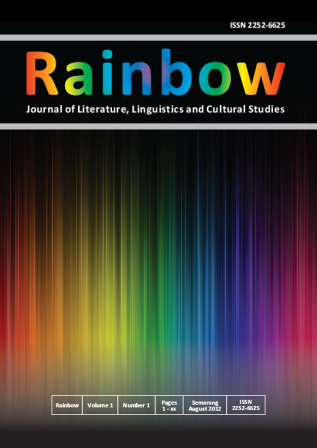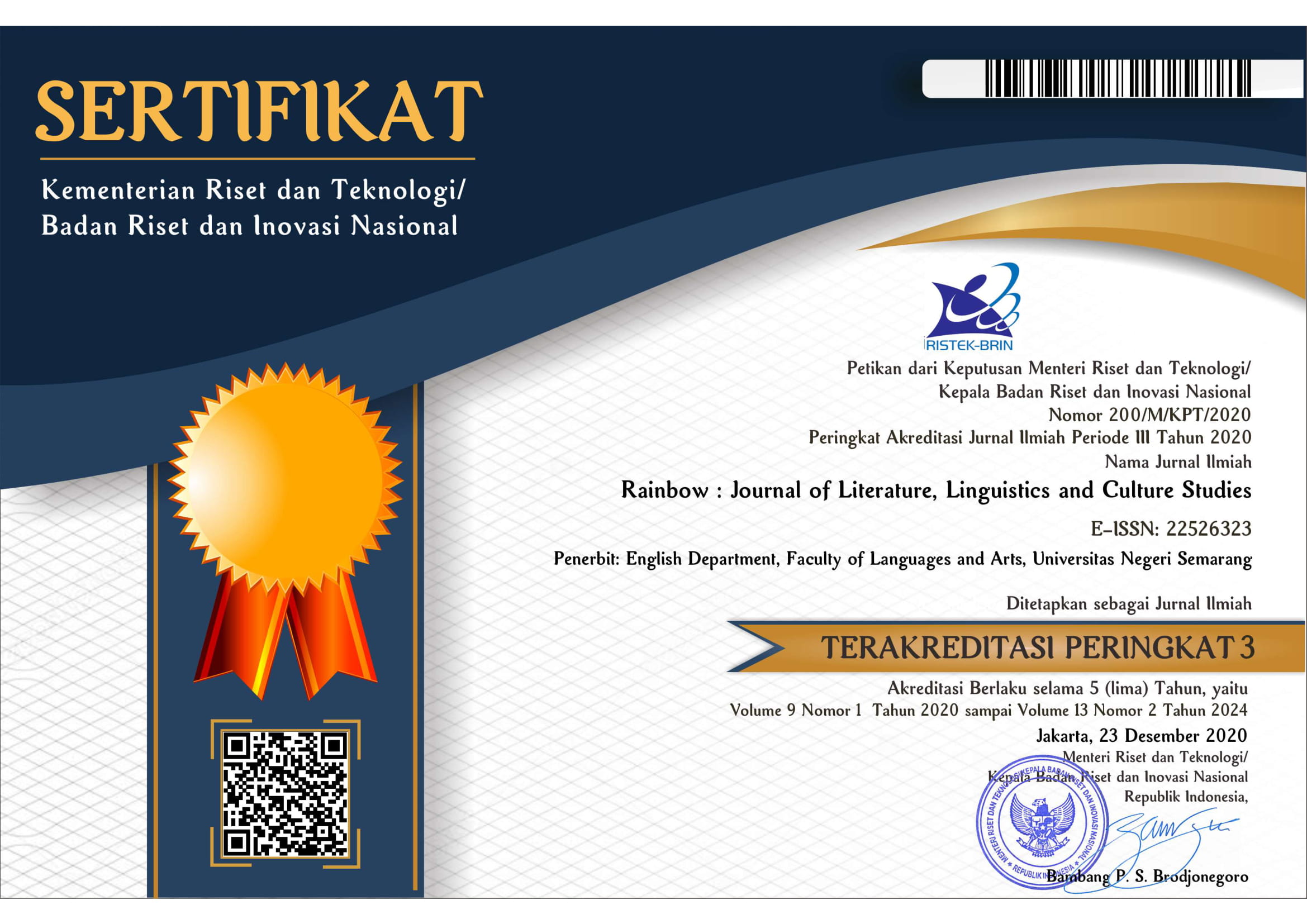POWER AND NARRATION IN AMERICAN SUPERHERO IN SPIDERMAN SECRET OF THE SINISTER SIX BY ADAM TROY CASTRO’S
Abstract
Spiderman Secret of The Sinister Six by Adam Troy Castro illustrated that superheroes as representation of sciences, power, and superiority. Superhero novel is very phenomenal for child to adult. Narration that are creating in this novel, trigger of understanding and believe that superhero as superior than Supervillain. So the aimed of deconstruction of superhero power to supervillain power. This research is use structuralism by Levi- Straus and deconstruction by Derrida, theory as a fundament of finding binary opposition for deconstruction analysis, and found the implied potensial meaning from this deconstruction. The result is first, Spiderman represented about American superiority, the narration created to strengthen and consolidate World's superpower had endured as American power. Narration about American power also created to discredit of Non-American. Although in this research is known that America is not entirely super power even tends to be weak, their power is affected by the allied countries. And their power is only found in countries that are experiencing economic instability and security. Second, Sinister Six represented as Non-American. They are always as a marginal group in international conference. But their inferiority (Non-American) in the world, they were trying to created technology or weapons defense system and war. They will create a tool to emulate the power owned by Americans. This work is to protect its citizens from regulations who are discredit their group. The deconstruction has been done earlier showed that the Sinister Six gang (Non-America) is a group of Superior, Good, and Loyal. While Spideman (America) is inferior class, Evil, and Rebellion.
References
Ahimsa, HS. 2013. Strukturalisme Levi-Strauss Mitos dan Karya Sastra. Yogyakarta: Kepel Press.
Barry, Peter. 1995. Beginning Theory: an Introduction to Literary and Cultural Theory. Manchester: Manchester University Press, translated by Widiawati and Setyarini. 2010. Beginning Theory: Pengantar Komprehensif Teori Sastra dan Budaya. Yogyakarta: Jalasutra.
Boehmer, Elleke. 1995. Colonial & Postcolonial Literature. Oxford University Press. Oxford.
Bressler, Charles E. 1998. Literary Criticism: An Introduction to Theory and Practice (2nd Ed). New Jersey: Prentice Hall.
Castro, Adam T. 2002. Spiderman Secret of The Sinister Six. New York: Marvel.
Derrida, Jacques. 1967. Of Grammatology. Baltimore, Md: John Hopkins University.
Endraswara, Suwardi. 2008. Metodologi Penelitian Sastra: Epistimologi, Model, Teori dan Aplikasi. Yogyakarta: MedPress.
Faruk. 2012. Metode Penelitian Sastra: Sebuah Penjelajahan Awal. Yogyakarta: Pustaka Pelajar.
Greimas, A.J. 1972. Semantique Structurale. Paris: Larousse.
Koesnosoebroto, S. 1998. The Anatomy to Prose Fiction. Jakarta: Departemen Pendidikan dan Kebudayaan Indonesia.
Lyotard, Jean-François. 1984. The Postmodern Condition. Manchester University Press. Manchester.
Martin, Vincent O.P. Existentialism: Soren Kierkegaard, Jean-Paul Sartre, Albert Camus, translated by Taufiqurrahman. 2001. Filsafat Eksistensialisme: Kierkegaard, Sartre, Camus. Yogyakarta: Pustaka Pelajar.
Norris, Christopher. 2006. Membongkar Teori Dekonstruksi Jacques Derrida. Yogyakarta: Ar-ruzz Media.
Russel, Bertrand. 1946. History of Western Philosophy and its Connection with Political and Social Circumstances from the Earliest Times to the Present Day. London: George Allen and UNWIN LTD, translated by Jatmiko, Sigit. Et al. 2007. Sejarah Filsafat Barat dan Kaitannya dengan Kondisi Sosio-Politik dari Zaman Kuno hingga Sekarang. Yogyakarta: Pustaka Pelajar.
Scholes, Robert. 1976. Structuralism in Literature: An Introduction. London: Yale University Press.
Strauss, Claude Levi. 1959. Anthropologie Structurale. PLON, translated by Ninik Sjams. 2005. Antropologi Struktural. Yogyakarta: Kreasi Wacana.







